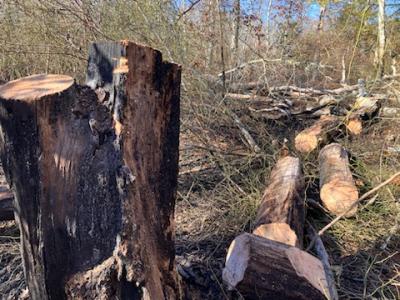Dartmouth battles six brush fires in one night
For the first time in a decade, a brush fire broke out on Dartmouth Natural Resource Trust property amid state warnings about drought conditions that are leaving dry leaves, dead vegetation and other fuels vulnerable to ignition.
The fire at the Trust’s Frank Knowles and Little River Reserve was one of six the town’s fire districts faced Friday night, Nov. 8.
District 2 Fire Chief Erick Turcotte said his department was called to two separate brush fires before a third came in for the Trust’s property, which turned out to be the biggest of the night.
Given the severity of the fire, the district received mutual aid from District 3, with District 1 providing station coverage, said Turcotte.
Even with their combined efforts, it took five hours to put it out, with teams hitting any remaining hotspots Saturday morning, according to DNRT Executive Director Nick Wildman.
“Fortunately, it wasn’t very extensive — or it didn’t appear to me that it burned very hot,” Wildman said, highlighting how there were saplings, vines and greenbriar that were still intact.
He estimates that less than a half an acre was affected by the brush fire, but said the Trust decided to close its Orange Trail for safety reasons as some trees had fallen.
Wildman also highlighted how the DNRT land manager met with the Dartmouth fire districts last year in order to provide GIS mapping for access points in the event of a fire near or on the Trust’s property.
“I’m really glad that we made sure that they had all the information they needed, not just to respond to fires on our property, but to respond for our neighbors when that’s necessary,” he said.
That state recently issued a brush fire warning due to the drought conditions, urging residents to use extra caution with any open flame or other heat source outdoors.
Turcotte said the exact causes of Friday’s fires are not known at this time. However, the state’s warning names power equipment, fire ashes and heating as well as cooking as common causes.
Based on the preliminary causes of recent fires, officials are asking residents to:
- Remember that open burning is prohibited statewide through January and in many communities year-round.
- Refrain from outdoor cooking and heating. Sparks and embers from chimineas, fire pits, and grills can easily ignite dry vegetation, debris, and overhanging branches.
- Use caution with lawnmowers, leaf blowers, all-terrain vehicles, and other power equipment. The engines can become hot enough to ignite dry leaves and grass.
- Dispose of ashes from fireplaces and wood stoves in a metal can, douse them with water, and cover them with a tight-fitting lid. These ashes can remain hot enough to ignite combustibles long after the fire goes out: never dump them outdoors or in the trash.
- Extinguish smoking materials in a sturdy ashtray with water or sand. Never toss cigarette butts, matches, or other smoking materials over the edge of a balcony, stub them out on stairs or railings, or toss them in dry vegetation or debris.













